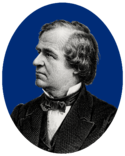1864 National Union National Convention
|
1864 presidential election |
|
 
Nominees
Lincoln and Johnson |
|
| Convention | |
|---|---|
| Date(s) |
National Union June 7–8, 1864 |
| City | Baltimore, Maryland |
| Venue | Front Street Theatre |
| Candidates | |
| Presidential nominee | Abraham Lincoln of Illinois |
| Vice Presidential nominee | Andrew Johnson of Tennessee |
The 1864 National Union National Convention was the United States presidential nominating conventions of the National Union Party, which was a name adopted by the main faction of the Republican Party in a coalition with some War Democrats after Republicans nominated John Fremont over Lincoln.
The party name was created in May 1864, during the American Civil War, ahead of the 1864 presidential election, in which President Abraham Lincoln, then a Republican, was running for reelection.
The Radical Republicans, a hard-line faction within Lincoln's own party, held the belief that Lincoln was incompetent and therefore could not be re-elected and had already formed a party called the Radical Democracy Party, for which a few hundred delegates had convened in Cleveland, Ohio, on May 31, 1864. They eventually nominated John C. Frémont, who had been the Republicans' first presidential nominee during the 1856 election.
Republicans loyal to Lincoln created a new name for their party in convention at Baltimore, Maryland, during the first week in June 1864, in order to accommodate the War Democrats who supported the war and wished to separate themselves from the Copperheads. The convention dropped then-Vice President Hannibal Hamlin, a Radical Republican from the ticket, and chose War Democrat Andrew Johnson as Lincoln's running mate. The National Unionists hoped that the new party and the Lincoln-Johnson ticket would stress the national character of the war.
...
Wikipedia
